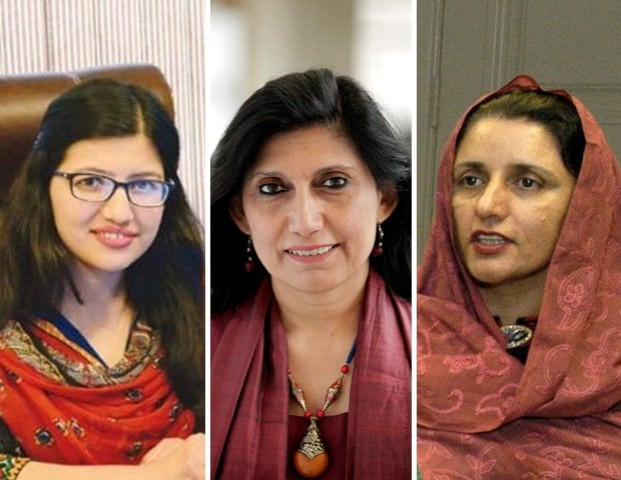Pakistan’s torchbearers: Women who carved space for themselves and others
Struggles of Fouzia Saeed, Zubaida Jalal and Abia Akram help us reflect on what has changed for women and what has not

From left to right: Abia Akram, Fouzia Saeed and Zubaida Jalal.
The country is home to many women who are struggling in their own ways to create space for themselves and for other women. Here, we speak to three such inspiring women – Fouzia Saeed, Zubaida Jalal and Abia Akram – to reflect on how things have changed for this gender and what more needs to be done.
‘These immoral NGO women’
Saeed is a well-known name among supporters of gender equality. She started her career with the United Nations Development Programme in 1994 and has been a vocal opponent of violence against women ever since. She currently heads Lok Virsa - the National Institute of Folk and Traditional Heritage in Islamabad.
Saeed grew up in Peshawar, long a stronghold of conservative values. In her early teens, she realised that certain activities were suddenly out of bounds for her as a woman. Physical training was one of them. The other was boys.
“If you go out and socialise in a group, it’s acceptable for your family,” she says. “But if you go out with one guy, it’s not.”
She accepted these restrictions and carved out freedom in other ways. Saeed says that wearing a chador was not something she had a problem with since she would much rather save her energy for substantive issues such as mobility and education.
In 1987, after completing a doctorate in education from the University of Minnesota, Saeed returned to Pakistan and began her journey towards female emancipation. Her second and most popular book Working with Sharks recounts her own as well as her colleagues’ experiences of encountering sexual harassment while working at the UN. All efforts to voice concerns to the higher management at the UN proved futile, and so Saeed began a humble campaign to acquire justice, along with a group of ten women, which later gained ground.
After that, she focused on the agents that would help her get the legislation passed. “I learned the jargon. I never used the word ‘gender’ or ‘women’s rights’. I needed to speak the language of my people.”
Instead, when travelling across provinces for consultations with the provincial governments for the passage of the bill prohibiting sexual harassment at the workplace, she made sure to call it the “Code of Conduct for gender justice” and not “the bill prohibiting sexual harassment” because “sexual harassment” was too “sexual” for the government. She made sure that she reviewed the Holy Quran and went armed with references from the Prophet’s life to support her cause and to explain that what she was asking for was not ‘un-Islamic’.
The backlash was inevitable. Even though she and her organisation avoided media attention and street protests, preferring to pursue their cause in a less confrontational way, they had to at some point, meet the extremists.
The climax took place in the Senate in 2010. The fundamentalists rallied in opposition to the bill. “These immoral NGO women, they go around and sleep in hotels,” one of them remarked.
No government in Pakistan has ever wanted to take on the religious circles, and so, Saeed and her peers were determined, yet anxious.
Female participation in Pakistan’s work force has increased over the years but remains staggeringly low. In 2012, it stood at 28% according to the World Development Report by the World Bank. Saeed observes that expectations regarding women’s status shot up when Pakistan had a female Prime Minister in Benazir Bhutto, but just because you are a woman does not mean your priority will be women’s rights.
“Benazir was a leader and she happened to be a woman,” Saeed says, but she never campaigned as a feminist.
Even in countries such as Pakistan, women who are economically independent have more opportunities and increased mobility. But Saeed feels that the discourse on class undermines a lot of the efforts made by educated women who use their relative privilege to change the system. She notes that rape and domestic violence happen to all women.
‘In Balochistan, you walk behind me’
The passage of The Protection against Harassment of Women at the Workplace Act is only the first step towards acquiring a safe environment for the women of Pakistan to step out, pursue their dreams and attain economic independence. There is still a long way to go.
But away from the federal capital, things might be murkier.
Zubaida Jalal Girls High School stands boldly among the date trees and rough sands of the far-flung Kech District in Balochistan as the symbol of female education and change. Kech has long been at an important crossroads; according to historical records, Alexander the Great passed through it on his way to India. Today, however, it is a name that many people in Pakistan would not even know due to its remote location.
The village of Mand in Kech District is a quintessentially tribal society dominated by the Rind tribe. The majority of the population is involved in farming and life is as communal as one can imagine. School enrolment rates for girls are comparatively higher than the rest of the province but still low compared to the rest of the country, so for a school to be named after a local woman is unusual.
Jalal may be considered an anomaly. Fair skinned, delicate and wrapped up in a chador, she comes across as the typical shy Baloch woman. However, once you read about her and meet her, you can only conclude that she must have nerves of steel.
Jalal was born in Kuwait in 1959, where she attended primary school. In 1976, she moved to Pakistan with her family on the death of her paternal grandfather. Jalal wanted to enrol in the high school in Mand, but there was only one high school, and it was boys-only. So instead, private tutors came to teach her at home until she could appear for the final exams at the high school.
In 1982, her father started the first girl’s school in Mand in their sitting room. Thirty-five girls showed up on the first day. Since girls in the village often marry at age 10 or 12, many were already married. What began in the sitting room eventually became the first girls’ high school.
In spite of her father’s stance on education, Jalal was bound by certain customs, so when she went to university in Quetta she was still not able to stay in a hostel. There were certain things that she denied herself so that it would not inhibit more girls from following her footsteps. Up till the 1990s, there was only one university in the province.
To be selected as the federal minister for Education sounds easier than it was. In a communal and patriarchal system, it is the father who becomes the subject of condemnation for his daughter’s actions. Some accused him of sending his daughters to study and then work because he wanted money. “Some of the local clerics said he had opened the doors to hell,” she adds.
Her mother warned her that she would have to watch her back. “I was a happy-go-lucky person, with my own nature, laughing loudly, but then there came a time when I had to change myself personally. She told me the man in front of you can misunderstand your smile”.
She got married one month after she was chosen as a minister. While she was pregnant, she went from village to village along barren mountains and coastal areas campaigning to male audiences. Three days after winning the elections, she had her first child, breaking dichotomies of the ‘working mother’ and the ‘homemaker’.
Jalal fought hard to prove herself during her tenure as education minister, introducing a number of reforms, the most revolutionary being removing religion from the education curriculum.
“The whole issue was putting more emphasis on human rights in Social Studies. We do not have to follow the Quranic version word-by-word because there are other children studying, and not all of them are Muslim.”
After marrying a Baloch man, the son of a politician, Jalal did not have to abandon politics or public life like most women in the country, but she did have to conform to some old behaviours.
“He told me, no matter where we go in the world or in Pakistan, do as your position requires. But when we reach Quetta, remember that you’re in Balochistan. The minute we get off the plane, I am in front and you’re behind. And that has been an agreement always,” she says with a laugh.
She thinks that Balochistan has changed quite a bit since 1999 when she started in politics. Girls are now studying sciences and enrol in co-educational institutions, but much still needs to be done.
‘Oh no! You have a disability’
In many circles, the debate on gender equality in Pakistan has become redundant. Women are faring better than their predecessors.
Millennial women are hopeful and determined, yet confused. For most girls, despite rising levels of education, settling down and marrying continues to be their ultimate goal. While women in Pakistan drive their own cars, vote, run for office, dress the way they want within cultural boundaries and even mix with the opposite gender, every girl still has to battle with deep rooted and repressive norms.
Abia Akram is a woman who has won that battle with even greater odds than most women face. Like many girls hailing from educated, upper-middle class families in Islamabad, she attended the Islamabad Model College for Girls, a state-owned girls’ college. Later she went on to do a graduate degree in Islamic history from the National University of Modern Languages. Now 32, Akram holds another graduate degree in gender and policy from the University of Warwick, which she attended on the prestigious Chevening Scholarship.
Unlike most girls, however, she did it all from a wheelchair. Akram was born with a genetic form of rickets that left her unable to walk.
“I felt very uncomfortable when I was growing up, people stared at me often but disability is about diversity in a way: some people are taller, some are shorter, some are fairer and some are darker. So why can’t disability also be accepted as a form of diversity in society?” she says.
Her experiences made her want to challenge attitudes towards people with disabilities. In 1997, while still a student, she started an organisation called the Special Talent Exchange Program (STEP), along with her brother to discuss issues faced by people with disabilities.
Living in the UK was also an eye opening experience as she had to manage everything on her own. Because of the facilities and infrastructure available, it did not seem as hard as she expected. What particularly transformed her was the fact that she was no longer a spectacle for others around her, but just someone in the crowd.
“I thought why people here are so comfortable with their disability? People would say ‘astaghfirullah’ (God forgive us) when they’d look at me back home,” she remarks with a smile.
The low social acceptance and awareness on disability has a lot of consequences for people like Akram. She says that there are only two perspectives on the issue, both of which are detrimental to her cause. One perspective is that people think disability is a punishment from God, so it entails the need to be confined at home, which leads to social isolation. Another perspective is that disability is something very close to God and so a person with a disability is someone ‘special’ in the eyes of God.
“People would go as far as asking me for prayers, thinking I am very ‘special’ in a way. I felt very uncomfortable when someone would ask me to pray for them,” says Akram.
When she first began to work on starting STEP, she decided to get in touch with her peers from the Special Education Centre and to bring them on board. However, when she went to their families, she received the distressful news about their deaths. Most had passed away and the reasons were shocking.
“They were not drinking enough water and urinating properly. Their parents told me that if they drink water they find it hard to use the washroom on their own so they have to take assistance from their family members which felt like compromising dignity and respect so they would not drink enough,” she tells.
So when she returned from the UK, she decided to increase her efforts to spread awareness. Through her organisation, 45 women with disabilities from Pakistan were able to go to various exchange programs abroad to learn and discuss their challenges at an international forum. Her main focus has been to change attitudes towards people with disabilities and bring greater acceptance.
But after working with so many organisations and global partnerships, she realised that women with disabilities were not well-represented in the disability movements all over the world. So she established the National Forum of Women with Disabilities.
Her dream is far from complete. For Akram, the lack of accessibility is one of the major hurdles she continues to face. Most public places in Pakistan are not at all conducive to people with disabilities, with neither ramps nor accessible washrooms. “It’s all about our infrastructure,” she says.
Akram feels her life changed when she became a part of the global disability movement and realised that her disability was not something to be ashamed of. She now wants to share this understanding with her country. So besides campaigning for better infrastructure, her organisation aims at tackling the attitudinal barriers head on.
During the course of her work, she has met with women with disabilities from far-flung areas of the country who were contemplating suicide. She has tried to engage with them and sent them on exchange programs to help them live a better life. “If I have been able to influence one woman, it is enough for me. I feel fulfilled,” she says.
Shanel Khaliq is a freelance journalist and a teacher who is interested in issues related to gender, race and social justice. She tweets @Shanel9999



















COMMENTS
Comments are moderated and generally will be posted if they are on-topic and not abusive.
For more information, please see our Comments FAQ